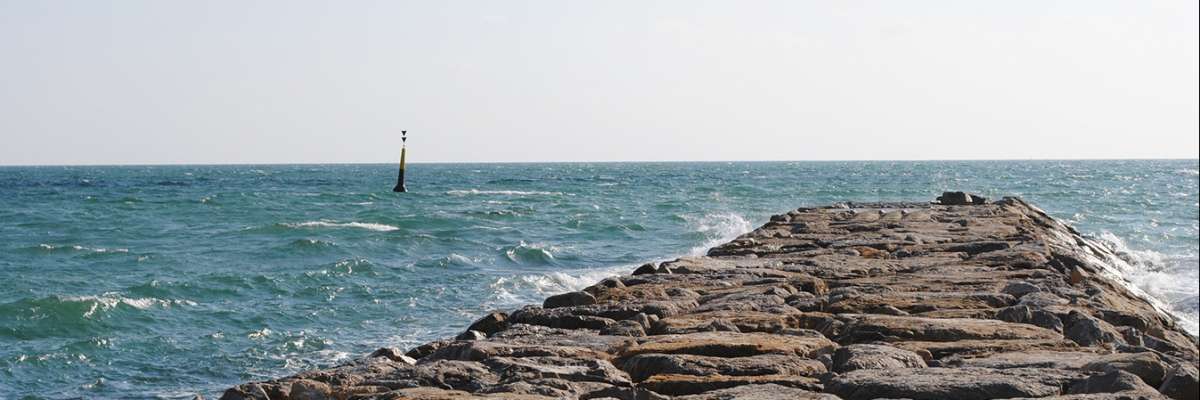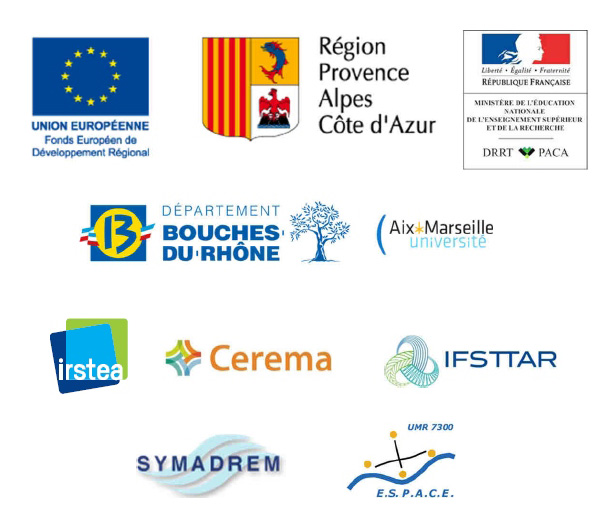
The aim is to create a research platform in the PACA region on the coast in order to allow permanent <i>in situ</i> observations of dyke behaviour, which will make it possible to examine the durability and performance of local materials treated with lime.
The DIGUE 2020 project aims to create a research platform in the PACA Region, on the Mediterranean coast (from 200 to 500 meters), and to make it available to academic and socio-economic actors in order to allow permanent observations <i>in situ</i>, over a significant period of several years. The project was born thanks to the support of the PACA Region and the European Union (European Regional Development Fund).
Breaking with traditional practices, the desired platform functions are:
-
To reduce the risk of breach caused by erosion thanks to a considerable gain, provided by soil-lime, in overflow and internal erosion resistance, and to a precise quantification of external actions on the structure;
-
To reduce the costs of dyke construction and maintenance;
-
To reduce transport nuisances by limiting the supply of materials from remote deposits, and by using local soils considered mediocre compared to conventional techniques;
-
To integrate the dyke and weirs into the landscaped environment without breaking ecological continuity;
-
To allow old dykes to be restored without deconstruction: by using local resources, and by reducing waste production.
The results are expected, in terms of improved knowledge of the following issues:
-
Actions of the sea on the protective dyke, including extreme actions, and a possible signature of their evolution in the context of climate change;
-
The durability of the dyke with respect to these actions, or how to assess the duration of its ability to perform its protective function against submersions;
-
Perception of the risk of marine submersion and perception of the effectiveness of the protective dykes by the populations of the territories concerned.
The knowledge developed and shared, via the envisaged platform, will allow in the medium term the development of projects for the reinforcement of existing dykes or development of new dykes of a more sustainable design, which could be proposed within the framework of the Rapid Submersion Plans, several of which are planned in the PACA region over the coming years.
In general and in the long term, the challenge is to help control the risks of marine submersion in a logic of protection of the inhabitants, while respecting sustainable development (use of a natural material: lime; and construction taking into account the aspects of a Natura 2000 classified site, etc.).
Lack of knowledge and feedback on limed materials in salty environments.
Collective components / modules (deliverables):
-
Design and construction of the platform (Mgr Symadrem, co-Mgr IRSTEA)
-
Quantify the actions of the sea and its consequences on the platform (Mgr Cerema)
-
Quantify the durability of the platform and its constituent materials (Mgr IFSTTAR)
-
Assess the perception and representation of the risk of marine submersion (Mgr ESPACE)
-
A platform will be built and instrumented to observe at full-scale the behaviour of a dyke structure made of lime-treated local materials.
-
An increase in knowledge will be generated relating to the quantification of sea actions on the platform, its durability and on the assessment of the perception and representation of the risk of marine submersion.
Cerema is rapporteur for one of the modules and is supervising a thesis aimed at improving non-destructive auscultation methods for dykes.
- IRSTEA lead
- IFSTTAR, Cerema, UMR ESPACE (AMU-CNRS), Symadrem

You have a question ?

